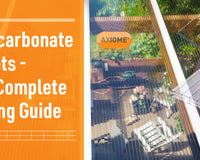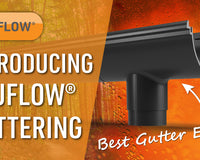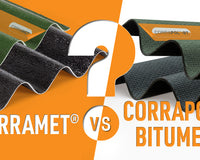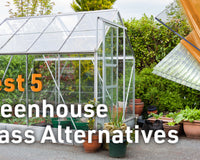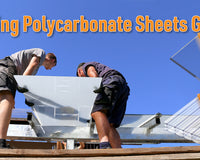Are you researching the best type of decking to use? After many question marks over the best garden decking material, the ultimate decking has been chosen. We will delve into the pros and cons of each before giving you a conclusive answer!
Decking is a fantastic way to improve your outdoor area. A good garden decking allows you to maximise your living space, creating a place for family and friends to socialise and relax.
Deciding between composite, wood, and aluminium decking will play a massive part in the overall finished look of your outdoor living space. No matter what material you choose to use there are important factors such as cost, maintenance, and overall look that will have an impact.
With so many different options on hand, it can be confusing to pick the right material for your deck. In this article, we will discuss the advantages and disadvantages of the three main decking boards: Aluminium, composite, and Timber. Click the below contents to skip to each analysis:
Aluminium Decking
Advantages of Aluminium Decking
An aluminium decking system, like Alupave® decking, is a very robust system that can be used on balconies, verandas and high-rise buildings due to its impeccable strength. Aluminium decking is the strongest decking material available and has the longest life span. Its life expectancy is over 40 years. With some lasting up to 60 years!
Taking life span into consideration means it’s very unlikely you are going to replace your decking once it's down. Although this is the most expensive decking to pay upfront, in the long run, it's going to save you money! Like anything, if you buy cheap generally, you’re going to end up buying replacements quite soon.
Compared to composite and timber boards, an aluminium decking board is also the most durable in hot and cold months, eliminating issues such as warping and discolouration.
Whether it’s a home or construction project, safety needs to be the first consideration, even more so in high-rise buildings. You might think this won’t happen however accidents often happen from patio heaters, BBQs, and fire pits, it’s not a risk you want to take. It’s down to these reasons that aluminium decking is the number one choice for balconies and fire remediation projects.
As it is extruded from aluminium this gives it natural fire-rated properties. It’s a fire resistant and safe option that gives you peace of mind compared to the likes of timber.
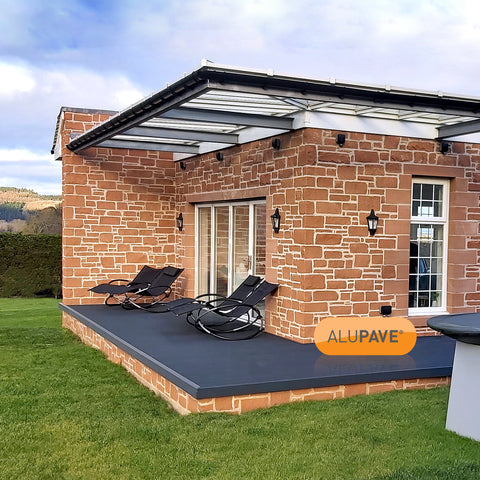
Unlike timber or composite option, Alupave Aluminium decking offers a unique patented full seal drainage system. This means you can keep water completely away from the substructure and channel water to one single point around the decking gutters.
Finally, compared to composite materials, aluminium decks are very eco-friendly. In fact, aluminium is infinitely recyclable! Being one of the most abundant minerals on earth, aluminium is a permanently available natural resource.
Disadvantages of Aluminium Decking
Although there is a premium initial cost for aluminium it can be a disadvantage for many to pay more upfront. In the long run, the life span and low maintenance cost will outweigh the upfront cost, turning this disadvantage into an advantage. Per year aluminium decking is the most cost-effective solution.
Composite Decking
Composite decking is a material made from a mixture of wood, fibres, and plastics. It is designed to give your garden the same look and feel as traditional timber decking without the disadvantages such as plain colours and woodworm.
Advantages of Composite Decking
Composite decking has a major advantage in colour choice and styles. They come in colours such as greys, browns and black. The most popular colour for composite decking is natural brown. This colour mimics the wood effect. It’s also important to mention that choosing a colour can define the fundamental colour scheme of your garden so choose carefully. Composite decking comes in a large variety of colours and finishes, you can see why this is an advantage compared to timber decking.
As composite decking is made from a mix of plastic and wood, it’s a lot more durable than timber. It has an average life span of 10-15 years; this is as long as it is looked after well. Many factors can affect your lifespan of composite decking such as:
- Inadequate Cleaning
- Warping and discolouration
- Carelessly dragging garden furniture

Disadvantages of Composite Decking
It only takes a quick search online to realise that discolouration and peeling have been major issues with composite decking over the last few years. With some manufacturers having to issue recalls and facing major replacement fines and costs.
Decking should be enjoyed in any season but let’s face it, summer is the best time of year to enjoy quality time with friends and family in the garden with the sun beating down. So, what does the sun on your composite decking mean for you?
Well, Composite decking will become weaker and expand in the hot weather. This can cause your decking to become distorted during the hot summer months. Warping can also be a headache with composite decking. Composite decking can also become so hot you cannot walk on the decking in bare feet. They are notorious for being uncomfortably hot decking. Of course, this is an even greater risk for children and pets.
Different manufacturers of composite decking boards, use different mixes of wood and plastic so aren’t necessarily recyclable like you may think. Aluminium is infinitely recyclable in comparison.
Timber Decking
Advantages of Timber Decking
Choosing timber decking for your garden will be the most budget-friendly option, in the short term. It’s got the smallest outlay upfront which is why people think wooden decking is worth considering. Although upfront the materials are cheaper, in time installing timber decking boards could end up costing you more than double, due to the need to carry out regular maintenance jobs, which we shall explore shortly.
Wooden decking has an approximate life span of 10-15 years however this is only when it has been maintained properly. Maintenance can include staining and treating the wood.
Wooden decking is also readily available on the market. Making it an easy go-to material to get as it is in almost any DIY or Garden shop to collect the same day.

Disadvantages of Timber Decking
Wooden decking is flammable meaning it can pose a significant fire hazard. In instances such as a fire outbreak nearby or anything hot being dropped on the deck, timber decking can easily catch fire and spread rapidly. With a large decking area, it can be hard to gain control of a fire especially when the material is wood. It’s for this reason more and more homeowners are leaving behind timber decking and going for a safer material; fire rated decking, which we will explore later in this article.
Wooden decking requires mandatory maintenance every year as it rots fast. For example, it will need to be cleaned, treated, and stained. All these maintenance procedures involve high costs which brings us to the next disadvantage, high maintenance costs.
Failure to maintain your garden decking will result in your decking becoming slippery, discoloured, dirty, warped, and most commonly rotting will start to take place. Once rotting does take place it's more than likely holes/gaps will start to appear in the decking. It’s worth noting that once your decking does start rotting it will need to be replaced.
With a low strength, it can easily warp, crack and splinter in a short time. This occurs particularly where it gets damps for long periods or where there are significant temperature changes.
Wooden decking can only be supplied in often very plain and bland colour options. You cannot paint a decking straight away, so before you install a timber decking into your garden it's worth mentioning you must wait at least 6 months to 1 year before staining or putting decking paint down. The look of freshly laid timber does look great however very quickly it can start to look worn out and untidy. If you’re looking for your garden to have that overall finished look without waiting a lengthy period, then timber is not for you. In the next section, we will discuss the biggest disadvantage of using timber decking; the maintenance required.
Woodworm is a common issue for wooden decking in the UK. Having wooden decking is the ideal place for woodworm to live. This is also going to incur the cost of hiring a specialist to treat this as it’s not a DIY job.
What are the Best Decking Boards to Use?
Without a doubt, aluminium is the best decking material to use on both residential and commercial projects. It is the strongest decking by far and has the longest life span out of all the materials at an impressive 40+ years. Most importantly, it’s a fire-rated decking solution which makes it ideal for commercial deck projects, like replacement balcony decking.
Please note that the A2 fire rating applies to the non-gasketed version of Alupave® Decking.
It is the most premium option however it is worth spending the extra money, if you can afford it, to have a long-lasting option that will provide you with a stunning-looking deck for many years, without the worry of constant maintenance.
There are advantages and disadvantages for all three materials. When it comes to picking your decking material it is dependent on the individual's time to manage the ongoing maintenance required and the project budget.
It is clear from weighing up the three common decking materials that if you are looking for a low maintenance and a long lifespan, then aluminium decking is the ultimate!
| Type of Decking | Aluminium Decking | Composite Decking | Timber Decking |
| Estimated Lifespan | 40+ Years | 10 Years | 5 Years |
| Initial Cost | Medium-High | Medium | Low |
| Maintenance Cost | Low | Medium-High | High |
Myths about Aluminium Decking
So you may be thinking about choosing aluminium decking but have some concerns. Here are some common myths that need busted.
The first myth we often find is that everyone thinks Aluminium decking gets very hot – Wrong! However, you wouldn’t be the first person to think this, so let’s explain two reasons why it doesn’t.
- Aluminium is a great conductor of heat and can adjust to different temperatures, it also means it will disperse heat evenly rather than in one area of the decking. The sun hitting your decking during the hot summer months is nothing to be concerned about.
- Aluminium decking is a hollow decking board meaning it’s a well-structured board, which will not only improve the overall strength of your decking, but it will also help diffuse the heat quicker. This means it’s less likely to get too hot and allows you to have nice cool decking. With solid decking such as timber, the heat gain will often be higher, meaning it will heat up quickly and take longer to cool down.
It is worth pointing out that like any decking this does depend on the level of ventilation underneath. Be sure to allow free airflow underneath your aluminium decking so that the dissipating heat can be dispersed. If you trap the air underneath the aluminium decking it can become much hotter due to heat build-up with trapped hot air, hence where this myth has come from.
Another myth relating to aluminium decking is it sounds ‘tinny’ when walked on! Wrong again! It certainly can be nosier than some composite decking but it’s more a different type of noise rather than louder or tinny. Aluminium decking is now manufactured with noise-reducing features that reduce the noise compared to other decking and removes any creaking noises you get, especially if you have timber decking.
Need Help choosing Decking for your Decking Project?
If you are needing help building quote for our decking boards please get in touch. Our Team will be happy to assist on our Live Chat or you can email shop@clearamber.com where our we will provide you with all the advice and support you require for your project.
Place Your Order Today – Get Same Day Despatch, Free Returns & Flexible Payment!










